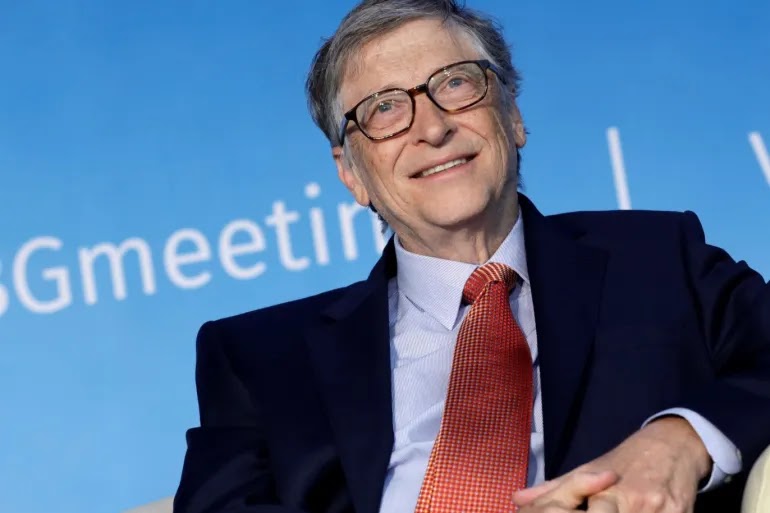US billionaire Bill Gates returned months ago to lecture at the Lakeside School in Seattle, on the anniversary of his graduation to his colleague Paul Allen, who then co-founded Microsoft. And after an audience of 1,500 people prepared to hear a lot of complex terms and mythological miracle-like experiences, Mr. Gates advises them to prioritize sleep, considering that this is what the current generation needs in the age of technology and artificial intelligence.
According to Fortune, Gates said he was influenced by "Why Do We Sleep?" To the British scientist Matthew Walker. He then talked about three other skills that he considered necessary for success, such as reading passion to satisfy the curiosity of learning, where he said he might read five books if he wanted to get an idea of something.
If you want to be like Bill Gates, read, and get some sleep. And learn the audacity of delegation, giving up some tasks for new experiences. They are resolved with optimism when they fail, by summoning the record of past successes. And so Gates puts four golden tips in our hands.
Sleep Well
Bill Gates didn't care about taking a vacation until his 30s, and he only realized the importance of sleep at the age of 64, when he read "Why Do We Sleep?" Professor of neuroscience at UCLA, Matthew Walker.
The author summed up the secret of sleep by saying "There is no single process in the human body that has not improved sleep," and the neglect of sleep causes many common problems, such as heart disease, diabetes, obesity, reduced fertility, and weak immune systems.
In his book, Walker emphasizes the obligation to sleep and wake up at a certain time, even on vacation days. Besides playing sports and being exposed to the sun for at least 30 minutes on most days. Avoid caffeine, nicotine, heavy meals, and drinking fluids before bed.
It also recommends taking a warm bath, darkening and cooling the room, avoiding blue light emitted by cell phones and tablet computers, to stimulate melatonin that helps speed sleep. He warns against staying awake in bed for more than 20 minutes and advises that he leave and do something else until he comes to sleep.
Read with curiosity
Gates is also a reader with a bag of books when he travels, and when he wants to learn something, he reads a lot of books about him to "always know more than the other person he's talking to." Perhaps it was his particular sensitivity to the question that led him to passion for research and reading, especially since he preferred isolation and did not communicate much with others.
It is therefore recommended to practice curiosity by "stimulating the knowledge available through books, or through online podcasts and lectures."
He also asserts that "in the coming decades, artificial intelligence will move to unexpected limits, giving priority to a person who has self-confidence as a reader and learner and who has a desire to continue to read and learn," reading, according to Robin Sharma, author of The Monk Who Sold His Ferrari, charges your energies and gives you hope, shortens you up to learn and do a lot less and less.
It also gives you the advantage of having a direct conversation with a writer that could change the shape of your entire life, by drawing on the experiences of the greatest minds, which is invaluable. And here's the power of audiobooks, they help you learn anytime or place.
Boldly delegated
Because "a lot of founders love their work," they hesitate to authorize others to do it, and so Bill Gates, like programming, he's good at it and he doesn't think about giving it to anyone else. And when his company started to expand, Gates found it difficult to give up his duties, thinking it might hurt the business.
But the fact is that everything developed for the better without his careful supervision, after he began to learn the art of delegation, employing many experienced people, while he became "a competent person, turning his attention to other regions, learning new things." Gates believes that "effective delegation stems from recognizing your strengths and weaknesses, and makes you benefit from the experience of others."
When you delegate part of your work, you save your time and enhance productivity by relying on a set of skills, allowing the development of new knowledge and competencies, to play all important roles when needed.
Already, last March, Microsoft announced that Bill Gates would be leaving his board position, full-time philanthropy in health, development, and education.
Optimistic when failing
Bill Gates describes his course of action as driven by a "very optimistic" mentality. He waited too long to overcome some difficulties "for his sense of optimism and confidence that things would work." This was another key element of success.
He thinks that "it's good to have clouds, but reminding you of your achievements many times, it can mitigate the temporary failure to keep moving forward."
He admits that "within Microsoft, all kinds of failures were there, but at the same time there were enough successes that we could afford to go to risk, tasting past successes and remembering them in times of failure as a way of future victories."
University of Pennsylvania psychology professor, founder of positive psychology, Martin Seligman, says that "positive feelings are what make life livable, optimists are more loved, do well in all fields, have better immunity, and are less likely to die of cardiovascular disease."

Comments
Post a Comment